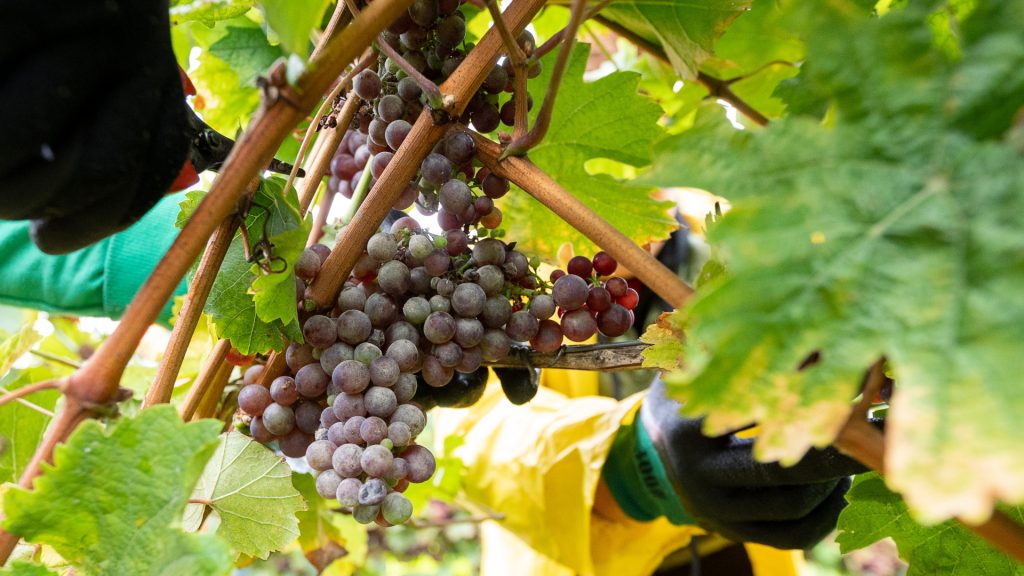Status: 12/11/2021 8:19 AM
Heavy rain, erosion and drought: the consequences of climate change are causing more and more problems for wine-growing communities. Eltville in Hessen reacts to different measures and also breaks with tradition.
Patrick Kunkel knows all too well the consequences of torrential rains on the Rheingau River. The Eltville mayor lives at the foot of a cliff and after these weather conditions he felt half the vineyard in the garden. Soil erosion is a huge problem – not just for Konkle and his garden. There is no soil washed away after heavy rain especially in the vineyards on the slope. So, Kunkel’s mission is: We save Riesling. With such an unofficial slogan, the mayor says, you are shaking more people than if you told them about your ‘climate-protection adaptation checklist’.
Sometimes the rain is heavy, sometimes very little
Rheingau is considered one of the best grape growing regions of Riesling in Germany. Of all the communities out there, Eltville has the most steep slopes and slopes. Steinberg in the Martinsthal region is so steep that many winemakers have long since given up.
The mayor says protecting valuable vineyard soils and preserving viticulture is the goal of his sustainability strategy. Because there are two problems that at first glance seem completely contradictory: Too much water and too little. “It rained quite a bit for several months, and then the floors dried up. And then a sudden heavy rain washed down everything,” Konkel says. So the aim of all measures should be to keep as much water as possible in the vineyard. This helps the vineyards and the people who live under the vineyards. The flood disaster in the Ahar Valley clearly showed that this could be vital.
Computer simulation reveals weaknesses
Also in Eltville, people drowned after a harmless current suddenly swelled. That was decades ago, but it should not be repeated under any circumstances. That is why the city underwent a computer simulation that investigated where and when it becomes dangerous. The problem is not with the Rhine – there, in the event of a flood, one can predict relatively early when the wave will peak. It is the small streams from which the danger threatens.
The mayor says he was very impressed with the torrential rain simulation: within a few seconds, everything on the screen turns blue, first light blue, then dark blue as the water flows. “You can see exactly how much rain parts of the city are disappearing.”
Heavy rain forces new cultivation
Climate change means that precipitation is getting bigger, faster and harder. The water removes tons of valuable vineyard soil on steep slopes and slopes, which later has to be painstakingly re-cultivated. This is preferable if the vines are planted along the slope as before. This is not only a tradition in Rheingau, as it gives the plants the maximum amount of sunlight. But with climate change, sunlight is no longer the main problem. On steep slopes like around Eltville, viticulture will have no future unless the vines are planted on terraces across the slope.
With 90 hectares, Hessian State Winery Kloster Eberbach grows more steep slopes than any other winery in Germany, including Rauenthal near Eltville. They are gradually turning into transverse stands, and therefore are a role model for other winemakers. Managing Director Dieter Greiner says, “The transverse balcony breaks up the slope, so to speak. It’s only a few meters from balcony to balcony, so the water flows slower. You keep it in the vineyard and reduce erosion.”
Other advantages of transverse balconies: work is less risky than working on a steep slope; Machines can be used there; Dams create valuable habitat for wild plants, insects, and small animals. Geisenheim University of Applied Sciences, specializing in viticulture, has developed its regional seeds for this. Hikers enjoy the diverse landscape of the vineyards.
Award winning septic tanks
The Eltville metropolitan area has 24 kilometers of streams, 23 kilometers of trench systems and 190 kilometers of dirt roads. Where does the rain water flow? How do you derive it in an exact way? But where can it be collected to feed plants and animals in the dry summer? Mayor Konkel and his warehouse manager Stefan Sephardt investigated these questions and learned a simple technique from forest workers. They collect rainwater simply by digging holes in the ground in the forest.
Seyffardt is now excavating these septic tanks along the vineyard paths: “We use the excavator to dig holes of three to five cubic meters at the edge of the path, where rainwater flows in and can slowly seep away.” This raises the groundwater table and dilutes its currents. There are already 20 septic tanks, the number of which can be up to ten times.
For these and other climate adaptation measures in viticulture, Eltville received the German Sustainability Prize last year. The city has been working with the Geisenheim University of Applied Sciences and the Wuppertal Institute since 2019. In addition, the city administration has established a network with the Association of Viticulture and local viticulture. Lots of persuasion and some rethinking is necessary. But together, they hope Eltville can avoid the fate of the Ahr Valley. Above all: Riesling has a future.








More Stories
Exploding Fireball: Find the meteorite fragments
Neuralink's competitor lets blind people see again with an implant
A huge meteorite has hit Earth – four times the size of Mount Everest